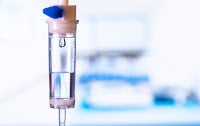A single infusion of ketamine in combination with psychotherapy may help people with alcohol use...
People With AUD May Benefit From Combination of Ketamine, Mindfulness Therapy

Treating people with alcohol use disorder (AUD) with a combination of ketamine and mindfulness-based therapy may lead to greater abstinence from alcohol than educating people with AUD about their disorder, suggests a report published today in AJP in Advance.
“The results showed that [three infusions of] ketamine increased the number of days abstinent from alcohol at three and six months compared with placebo,” wrote Meryem Grabski, Ph.D., and Amy McAndrew, Ph.D., of the University of Exeter and colleagues. “The greatest difference in percentage of days abstinent from alcohol was between patients given ketamine and therapy and those given placebo and education.”
The study included adults aged 18 to 65 years who met DSM-5 criteria for moderate to severe AUD or DSM-IV criteria for AUD and had been abstinent from alcohol for at least 24 hours. Individuals were excluded from the trial if they had uncontrolled hypertension, were taking antihypertensives or antidepressants, and/or had current suicidal ideation. Other exclusion criteria included a diagnosis of any current or past psychiatric disorder (except depression, anxiety, AUD, or alcohol dependence) or of substance dependence other than AUD or ever seeking professional help for dependence on an illicit substance.
Ninety-six adults with AUD (35 women; average age 44 years) were randomly assigned to one of four treatment groups: (1) ketamine and therapy, (2) ketamine and alcohol education, (3) saline (placebo) and therapy, and (4) saline and alcohol education. The participants were encouraged to attend 10 study visits.
Beginning at visit 2, all participants received either 90-minute therapy or alcohol-education sessions. The therapy sessions focused on relapse prevention, mindfulness, and the promotion of well-being. The alcohol education sessions focused on the biology of addiction and steps to improve and maintain a healthy lifestyle. Also beginning at visit 2 and repeated at visits 4 and 6, the participants received infusions of either ketamine or saline. All participants participated in therapy or alcohol-education sessions prior to receiving their infusion and 24 hours later for a total of seven sessions. On average, it took participants 190 days to complete the trial (from randomization to visit 10).
The participants reported on alcohol use at each study visit and wore alcohol-monitoring bracelets through the end of treatment (visit 8). After the alcohol-monitoring bracelets were removed, the participants were asked to record alcohol use in a diary until the end of the trial.
Participants in the ketamine group reported a significantly greater number of days abstinent from alcohol compared with those in the placebo group at six-month follow-up (mean difference=10.1%), with the greatest difference in the ketamine plus therapy group compared with the saline plus education group (mean difference=15.9%), Grabski, McAndrew, and colleagues reported. There was no significant difference in relapse (recurrent heavy alcohol use) at six months between the ketamine and placebo groups.
“This study demonstrated that treatment with three infusions of ketamine was well tolerated in patients with alcohol use disorder and was associated with more days of abstinence from alcohol at six-month follow-up. The findings suggest a possible beneficial effect of adding psychological therapy alongside ketamine treatment,” the authors concluded.
For related information, see the American Journal of Psychiatry article “A Single Ketamine Infusion Combined With Motivational Enhancement Therapy for Alcohol Use Disorder: A Randomized Midazolam-Controlled Pilot Trial.”
(Image: iStock/georgeoprea9)
CMS Field Tests Psychiatry Cost Measures, Invites Comments
The Centers for Medicare & Medicaid Services (CMS) is conducting field testing for five episode-based cost measures for the Merit-based Incentive Payment System (MIPS). The goal is to collect feedback on these cost measures for major depressive disorder and psychoses/related conditions. Testing will include assessment of the measures’ importance, scientific acceptability, and clinical validity. Clinicians and clinician groups with at least 20 episodes for at least one measure will receive a Field Test Report with information about their cost performance; feedback will be used to consider potential measure refinements. Draft specifications for each measure are available on the CMS website. The field testing ends Thursday, February 25.
APA is interested in reviewing Field Test Reports with APA members to inform our feedback to CMS. If you have received a cost report and are open to discussing it with APA staff, please contact Andrew Lyzenga at alyzenga@psych.org. Also, reach out if you have any questions, comments, or input on episode-based cost measures or the field testing process.





